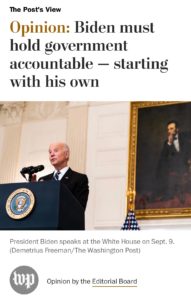DOWNLOAD RESPONSIVE GOVERNMENT AS PDF
Federal regulations are critical elements to implementing public policy. They provide the protections the country needs to ensure that our food is healthy, our children’s toys are safe, our air and water are clean, dangers in our workplaces are reduced or eliminated, and our economy functions efficiently and effectively. Despite the importance of these essential governmental functions, for at least a generation, many politicians and social commentators have taken aim at these protections.
The attack on regulation reached new heights over the past few years. President Trump has proudly promoted a massive attack on sensible safeguards. “We’re here today to celebrate and expand our historic campaign to rescue American workers from job-killing regulations,” he told an audience at the White House in July 2020. “Before I came into office, American workers were smothered by a merciless avalanche of wasteful and expensive and intrusive federal regulation… Nearly four years ago, we ended this regulatory assault on the American worker, and we launched the most dramatic regulatory relief campaign in American history by far.”
Lost in these discussions is the benefits derived from such regulations. Instead, government has prioritized the costs—and mainly the costs to the regulated entities. Simply returning to the pre-Trump administration days is not an acceptable solution because even then the regulatory process was unfairly tilted in favor of regulated entities against consumers, workers, minorities, and others. The current health pandemic has demonstrated the importance of government regulation that puts people first. These recommendations present a reboot, a new way to view regulation as a way to protect the most vulnerable in our society and to pursue the common good.

